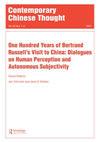An Outline of Wang Chuanshan’s Dialectics
IF 0.4
3区 哲学
0 ASIAN STUDIES
引用次数: 0
Abstract
Wang Fuzhi’s 王夫之 philosophy was generated from unique historical circumstances in the 17th century. First of all, his philosophy as a whole touched on the cognitive aspects of several distinct processes, which he termed “inquiring the pattern through approaching concrete affairs” (ji shi qiong li 即事穷理), “governing the heart by the pattern” (yi li yu xin 以理御心 ), “crystallizing the way through [letting it] immerge in virtue” (ru de yi ning dao 入 德以凝 道 ), and “discerning the continuing through summarizing the changing” (yao bian yi zhi chang 要变以知常). Second, he examined the objective and contradictory movement of nature and human society with the dialectics of “integrating the manifold and synthesizing contrasts” (hui qi canwu, tong qi cuozong 会其参伍, 通其 错综), in order to put forward the dialectical historical view of nature and human society that “wholly realizes the change in the pattern of things and human affairs” (ji wuli renshi zhi bian 极物理人事之变). In addition, Wang also completed dialectical research on the process of cognition itself. By proposing that “the heart keeps pace with the coming of the affairs” (shi zhi lai, xin zhi wang事之来, 心之往) or, in other words, “how beginning and end form one structure and how outside and inside combine their properties” (shi zhong tong tiao, nei wai he de 始终同条, 内外合德), he established a unique dialectical epistemology. These three aspects in Wang’s naive materialistic dialectics mutually contain and correspond to each other, but they also have their own different categories and systems, and therefore it is possible to study them respectively. In this article I will provide an outline of Wang’s unique dialectics.王船山辩证法论纲
王夫之王夫之 哲学产生于17世纪独特的历史环境。首先,他的哲学作为一个整体,触及了几个不同过程的认知方面,他称之为“在具体事务中探究模式”(季士琼李即事穷理), 以格局治心以理御心 ), “以德化道”(鲁)入 德以凝 道 ), 从总结变化看继续要变以知常). 其次,他用“综合多方面、综合对比”的辩证法考察了自然与人类社会的客观矛盾运动会其参伍, 通其 错综), 提出“全面实现人与物格局的变化”的辩证史观极物理人事之变). 此外,王还完成了对认识过程本身的辩证研究。提出“心随事来”事之来, 心之往) 或者,换句话说,“始与终如何构成一个结构,内外如何结合它们的性质”始终同条, 内外合德), 他建立了独特的辩证认识论。王朴素唯物辩证法中的这三个方面是相互包容、相互对应的,但它们也有各自不同的范畴和体系,因此可以分别加以研究。在这篇文章中,我将概述王独特的辩证法。
本文章由计算机程序翻译,如有差异,请以英文原文为准。
求助全文
约1分钟内获得全文
求助全文
来源期刊

CONTEMPORARY CHINESE THOUGHT
Multiple-
CiteScore
0.10
自引率
0.00%
发文量
0
期刊介绍:
This wide ranging journal is essential reading for anyone who wants to understand the diverse themes and influences that shape Chinese thought today. It features translations of the most current and influential Chinese writings on all aspects of philosophical endeavor, from theoretical essays on systems to studies of China"s cultural and religious development, from interpretations of the Chinese classics to exegeses on Marxist thought.
 求助内容:
求助内容: 应助结果提醒方式:
应助结果提醒方式:


